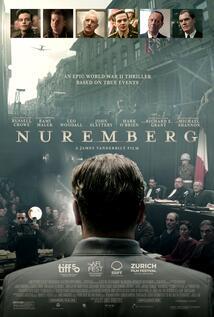

What a missed opportunity. Writer/director James Vanderbilt boils down the most significant events in modern international law to the equivalent of a high-school production of A Few Good Men. Maybe it shouldn't be a surprise. Ever since brilliantly adapting Robert Graysmith's book Zodiac Unmasked into David Fincher's film Zodiac, Vanderbilt has been responsible for simple-minded dreck like Truth, the Scream reboot, and Adam Sandler's Murder Mystery movies.
Nuremberg is based on Jack El-Hai's non-fiction book The Nazi and the Psychiatrist, which is an account of the interactions between Douglas Kelley, the young American psychiatrist tasked with determining the mental competence of the accused Germans slated to stand trial at Nuremberg, and Reichsmarschall Hermann Göring, the most senior surviving Nazi put on trial in Nuremberg. Kelley's youth enables Vanderbilt to dumb this picture down to an unforgivable level. I've never seen Michael Bay's Pearl Harbor, but its focus on youthful shenanigans and ignorance can't be worse than this. The film attempts to showcase the horrors of Nazi atrocities by intertwining discussion of them, complete with actual film footage of concentration camps, with the insignificant victories and defeats of the plucky, ambitious Kelley.
As Göring, Russell Crowe does a fine job making evil incarnate into the type of crafty movie villain we enjoy spending time with. Similarly, playing the prosecuting counsels—Associate Justice of the U.S. Supreme Court Robert H. Jackson, and conservative British attorney David Maxwell Fyfe—Michael Shannon and Richard E. Grant do not embarrass themselves. The same can not be said for the rest of the cast. White Lotus star Leo Woodall plays Sgt. Howie Triest, the German-born US Army soldier who served as a translator for the psychiatrist team, as if he were playing a love-sick teen on Dawson Creek. John Slattery plays commandant of the Nuremberg Prison, Burton C. Andrus, in much the same way he played Ben Bradlee Jr. in Spotlight, though that folksy authority feels out of place in this setting. Colin Hanks plays a rival army headshrinker in the same lunkheaded way Colin Hanks seems to play every character. And the less said about Lydia Peckham's performance as a sexy journalist, the better. But I will point out the atrocious way her character is written. When you have a character like this in your 148-minute movie, they need to have either just one great scene or actually make them a character with some depth throughout the movie. You can't just have them show up three times to tag a base.
Still, the darkest stain on this unforgivably simplistic movie is Rami Malek, who portrays Kelley like an eager 12-year-old who has just landed his first role in a school play. Granted, this screenplay is terrible; it features scene after scene of characters explaining things to each other that, not only would they know, but that most 21st-century Americans would know (if we still lived in a functioning democracy). No one can make dialogue like this feel natural, but at least Shannon and Grant can sell it as amusing movie-speak. Malek goes for broke and tries to infuse the terrible role with as much emotional sincerity and youthful exuberance as he can. The results are painful to watch. It made me appreciate what Matt Damon can do with similar material, and how subtle and nuanced Tom Cruise's over-the-top performance is in A Few Good Men.
This movie actually made me appreciate A Few Good Men, Aaron Sorkin's insanely overpraised play and the subsequent multi-Oscar-nominated film. Indeed, if this is what passes for standard historical drama these days, no wonder everyone thought Oppenheimer was the greatest film since Lawrence of Arabia. Fortunately, we still have Stanley Kramer and Abby Mann's terrific fictionalized 1961 film Judgment at Nuremberg, and the many excellent documentaries made from the actual footage of the Nuremberg Trials, so we don't need to rely on this piece of crap for our historical Cliffs-notes. We also have the current state of would, which serves as a far effective reminder that "It can indeed happen here" than the hand-fisted ending to this picture.
James Vanderbilt's 1980s TV mini-series approach to dramatizing the Nuremberg Military Tribunals reduces the most significant events in modern international law to the equivalent of a high-school production of A Few Good Men.




